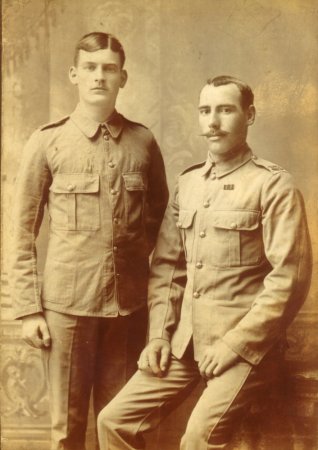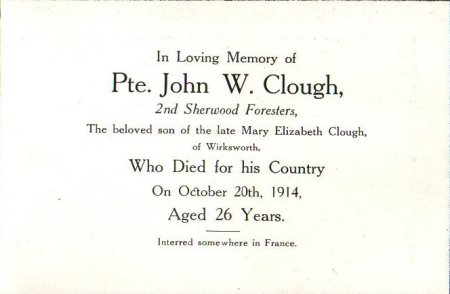John William Clough was born at the town of Wirksworth in Derbyshire in
1888, the second of ten children born to William and Mary Elizabeth Clough,
though one of these children died as a young baby. Wirksworth is one of
the ancient parishes of Derbyshire and lead mining was the basis of its
past prosperity, being mined as far back as Roman times. Standing as it
does virtually at the centre of Derbyshire, about two miles to the south
of the Peak District National Park boundary, Wirksworth was the centre of
the English lead mining industry when it was at its height. As the lead
mining industry declined in the nineteenth century, the limestone quarries
provided work for people who lived in the area. John Willie, as he was
affectionately known, was raised amongst a community of quarry workers in
a typically working class household on The Dale at Wirksworth. He had to
endure a difficult upbringing at Wirksworth as his father was often out
of work due to a disability and spent regular spells in the County Prison
at Derby due to non payment of rates. After completing a basic education
at Wirksworth, John Willie found employment in the local limestone
quarries of Messrs Bowne and Shaw, where his father was employed as a
lime burner.
As a teenager John Willie had spent a period as a volunteer soldier with
the 2nd Volunteer Regiment of the Sherwood Foresters (Notts and Derbys
Regiment). As a possible consequence of his difficult home life, John
Willie took the decision to become a professional soldier and was attested
as a regular soldier with the Sherwood Foresters on the 28th of August
1906, signing up for seven years’ service. He was aged eighteen years and
nine months at the time. Family recollections suggested that he had spent
time serving on colonial duty in India and a photograph survives of John
Willie which was taken in Bangalore in India. So, John Willie spent some
time with the 1st Battalion who saw service in colonial India for a number
of years, initially at Bangalore from 1906, followed by service in
Secunderabad from 1909 and Bombay from 1912. Indeed, John Willie’s army
medical records state that he spent time in Colaba, a dependency of Bombay,
where he was twice treated for scabies, in the March and June of 1913.
His seven years service with the Sherwood’s ended in August 1913 at which
point he returned to England and was placed on the army’s reserve list.
He presumably returned to his native Wirksworth, taking up a new
occupation, probably returning to work in one of the local quarries.
On the 4th of August 1914 a telegram ordered the 2nd Battalion of the
Sherwood Foresters to mobilise for war. The 2nd Battalion were enjoying
their last moments of peace in Sheffield and its sister battalion, the
1st Battalion on overseas duty, was recalled from duty in Bombay, India.
As a reservist, John Willie must have often contemplated the reality of
war and how he would respond to it. Now the period of contemplation was
over. With the war barely hours old he said goodbye to his family and
responded to his country’s call. The 2nd Battalion was bought back to
strength by recalling reservists such as John Willie and would be in
France by the 10th of September 1914 as part of the 18th Brigade, 6th
Division, I Corps, to reinforce the British Expenditionary Force, and
went straight into the bitter fighting on the Aisne.
By the 18th of October 1914, the 2nd Battalion arrived in Ennetières.
The B, C and D Companies dug themselves in and the A Company remained
in reserve in the village. About 9.00pm the battalion was attacked by
rifle and shell fire which lasted until about 1.00am. The battalion
remained in the same position throughout the 19th with the enemy’s
snipers being very active. At about 1.00pm on the 20th a vigorous attack
was made by the enemy on the front trenches. This was driven off, but
not without considerable loss. A further advance by the enemy at about
3.00pm was very rapid, leaving the battalion vastly outnumbered. The
few remaining men were collected up and fell back. Tragically, John
William Clough was killed in action during this major battle at
Ennetières on the 20th of October 1914 at the age of 26 years. During
this battle the 2nd Battalion had managed to hold a vastly superior
German force for 48 hours and John Willie was one of 710 men and 13
officers who were lost.
John Willie has no known grave but his name is commemorated on Panel 7
of the Ploegsteert Memorial in Belgium which commemorates more than
11,000 servicemen of the United Kingdom and South African forces who
died in this sector during the war and have no known grave. He is also
commemorated on the war memorial in his native town of Wirksworth.
Bereaved were his father, six brothers and two sisters, who held a
memorial service in John Willie’s honour at Wirksworth.



